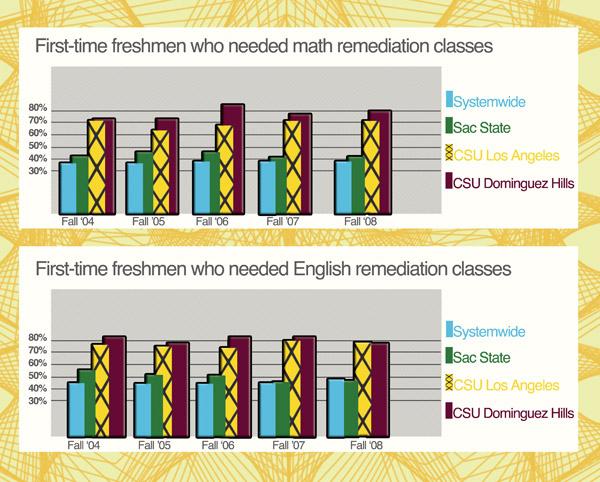Report shows lack of skills

remedial:Source: CSU analytic studies website:Megan Harris – State Hornet
May 4, 2010
More than half of the freshmen in the California State University system are not prepared for college, according to a recent report by the Legislative Analyst Office.
In 2008, approximately 57 percent of admitted CSU freshmen needed to take remedial classes in math or writing, according to the report. Sacramento State admits more than 70 percent of freshmen who need to take such courses.
Professor of educational economics Jessica Howell said she was alarmed by the high figure.
“I teach an intro econ class where you need to be able to divide and multiply, and you occasionally need to write some sentences. In general, I think the skill set I see is pretty poor,” Howell said.
Howell, who has written extensively on the subject of remediation, said a variety of factors could contribute to the high number of students in California who are not prepared for college.
“We have a lot of non-native speakers who obviously are required to need remediation in English,” Howell said.
Howell said high school teachers often do not focus on college-level skills in the classroom. For example, most high school seniors are required to take British literature, even though the English Placement Test for the CSU does not ask any literature questions.
For several years, Learning Skills Center Director Robby Ching and many others have worked on developing a plan called the Early Assessment Program. The plan would create high school courses that would focus more on college-level writing and math skills.
Ching has been developing a course that emphasizes expository reading and writing. Students would read multiple writings on social topics like obesity or bullying, and write fact-based essays on the topic.
“Seventy-five percent of students end up in remediation because of their reading scores,” Ching said. “I mean critically reading, challenging texts, finding out what arguments those texts are making, finding the counter-arguments, finding what kind of support is being used, and how credible it is.”
Ching said her other CSU colleagues are working on training high school math teachers to teach more problem solving.
“Getting teachers up to speed in how to teach problem solving, and critical thinking when it’s applied to math is just as important as teaching teachers how to teach critical math,” Ching said.
Some people think that standards may simply be higher for CSU campuses, which creates the illusion that incoming freshmen are less prepared than the rest of the nation.
“While I am perfectly willing to let the CSU say that our standards are so high, that’s why our remediation rates are so high,” Howell said. “My experience in the classroom is that there are a lot of people who can’t write very well and can’t do simple math very well.”
CSU spokesman Erik Fallis said he understood that unprepared freshmen are a large concern.
“We have as our mission to serve the top one-third of high school graduates, but the fact is that students coming out of the K-12 system, even though they may meet all that baseline criteria, may still be unprepared for college,” Fallis said.
An average CSU freshman who has taken remedial courses in college had a high school GPA of 3.1.
Fallis said the CSU system is working on many proposals to prepare younger students for college. The CSU system recently started a bus-tour campaign to speak to middle school students across the state about the importance of preparing for college early.
Another aspect of the Early Assessment Program is a set of optional questions at the end of the annual standardized tests for high school juniors. These questions test juniors’ college-level writing and math skills, giving students an early indication of whether they are prepared for college.
Howell found that it decreased remediation rates by 4 percent in math, and 6 percent in English. Howell said the evidence suggested that student’s get a “wake-up call” when they find out they are not prepared for college-level math or writing.
“The evidence we have does indicate that students doing more with their senior year and are becoming more academically prepared to start college,” Howell said.
Ching said although there has been some progress, it will take a long time to significantly reduce remediation. She said faculty layoffs in high schools and larger classes may make the problem worse.
Timothy Sandoval can be reached at [email protected].




























































































































